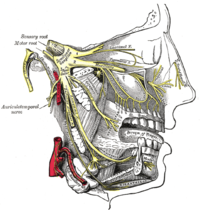
Photo from wikipedia
Migraine pain is frequently accompanied by cranial hyperalgesia and allodynia. Calcitonin gene-related peptide (CGRP) is implicated in migraine pathophysiology but its role in facial hypersensitivity is not entirely clear. In… Click to show full abstract
Migraine pain is frequently accompanied by cranial hyperalgesia and allodynia. Calcitonin gene-related peptide (CGRP) is implicated in migraine pathophysiology but its role in facial hypersensitivity is not entirely clear. In this study, we investigated if the anti-CGRP monoclonal antibody fremanezumab, which is therapeutically used in chronic and episodic migraines, can modify facial sensitivity recorded by a semi-automatic system. Rats of both sexes primed to drink from a sweet source had to pass a noxious mechanical or heat barrier to reach the source. Under these experimental conditions, animals of all groups tended to drink longer and more when they had received a subcutaneous injection of 30 mg/kg fremanezumab compared to control animals injected with an isotype control antibody 12–13 days prior to testing, but this was significant only for females. In conclusion, anti-CGRP antibody, fremanezumab, reduces facial sensitivity to noxious mechanical and thermal stimulation for more than one week, especially in female rats. Anti-CGRP antibodies may reduce not only headache but also cranial sensitivity in migraineurs.
Journal Title: Neurology International
Year Published: 2023
Link to full text (if available)
Share on Social Media: Sign Up to like & get
recommendations!